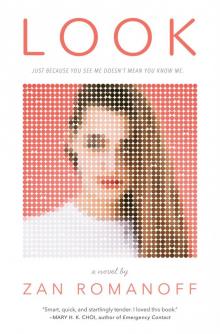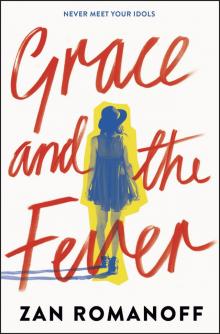- Home
- Zan Romanoff
A Song to Take the World Apart
A Song to Take the World Apart Read online
THIS IS A BORZOI BOOK PUBLISHED BY ALFRED A. KNOPF
This is a work of fiction. Names, characters, places, and incidents either are the product of the author’s imagination or are used fictitiously. Any resemblance to actual persons, living or dead, events, or locales is entirely coincidental.
Text copyright © 2016 by Zan Romanoff
Cover illustration copyright © 2016 by Richard Bravery
All rights reserved. Published in the United States by Alfred A. Knopf, an imprint of Random House Children’s Books, a division of Penguin Random House LLC, New York.
Knopf, Borzoi Books, and the colophon are registered trademarks of Penguin Random House LLC.
Grateful acknowledgment is made to the following for permission to reprint previously published material:
Hal Leonard Corporation: Excerpt from “Lorelei,” words and music by Philip Chevron, copyright © 1989 Wardlaw Banks Ltd. Administered by Downtown DLJ Songs. All rights reserved. Reprinted by permission of Hal Leonard Corporation.
Wixen Music Publishing, Inc: Excerpt from “Mercedes Benz,” by Janis Joplin, Michael McClure, and Bob Neuwirth, copyright © 1970 Strong Arm Music (ASCAP). Administered by Wixen Music Publishing Inc. All rights reserved. Used by permission.
Visit us on the Web! randomhouseteens.com
Educators and librarians, for a variety of teaching tools, visit us at RHTeachersLibrarians.com
Library of Congress Cataloging-in-Publication Data
Names: Romanoff, Zan, author.
Title: A song to take the world apart / Zan Romanoff.
Description: First edition. | New York : Alfred A. Knopf, [2016] | Summary: “Lorelei has the power to change hearts and minds, just by singing, but it comes at a terrible cost.” —Provided by publisher
Identifiers: LCCN 2015043446 | ISBN 978-1-101-93879-9 (trade) | ISBN 978-1-101-93881-2 (ebook)
Subjects: | CYAC: Singing—Fiction. | Sirens (Mythology)—Fiction. | Love—Fiction. | BISAC: JUVENILE FICTION / Social Issues / Dating & Sex. | JUVENILE FICTION / Legends, Myths, Fables / General. | JUVENILE FICTION / Girls & Women.
Classification: LCC PZ7.1.R6683 So 2016 | DDC [Fic]—dc23
Ebook ISBN 9781101938812
Random House Children’s Books supports the First Amendment and celebrates the right to read.
v4.1
ep
Contents
Cover
Title Page
Copyright
Dedication
Epigraph
Chapter 1
Chapter 2
Chapter 3
Chapter 4
Chapter 5
Chapter 6
Chapter 7
Chapter 8
Chapter 9
Chapter 10
Chapter 11
Chapter 12
Chapter 13
Chapter 14
Chapter 15
Chapter 16
Chapter 17
Chapter 18
Chapter 19
Chapter 20
Chapter 21
Chapter 22
Chapter 23
Chapter 24
Chapter 25
Chapter 26
Chapter 27
Chapter 28
Chapter 29
Chapter 30
Chapter 31
Chapter 32
Chapter 33
Chapter 34
Chapter 35
Chapter 36
Chapter 37
Chapter 38
Chapter 39
Chapter 40
Chapter 41
Chapter 42
Chapter 43
Chapter 44
Chapter 45
Acknowledgments
In memory of Amelia Izquierdo and Anne Evans
For Mom, Dad, and Tiny, of course
the only thing I’ll ever ask of you
you gotta promise not to stop when I say when
—FOO FIGHTERS, “Everlong”
LORELEI AND ZOE LIE about going to the see the band.
It is, as usual, Zoe’s idea. She’s the one who pulls a flyer down on her way to geometry, and slips it to Lorelei as she walks up the aisle to her seat. When Lorelei unfolds it, she recognizes it right away: she’s been seeing the posters and ignoring them for weeks.
This one is printed on salmon-colored copy paper. On it, two figures lean against one another in silhouette. Their heads are thrown back and their guitars are raised ecstatically. They’re surrounded by lazy hand-drawn doodles of stars and spirals and peace signs and pot leaves. THE TROUBLE at the ROXY, it says. Zoe has scrawled across the back: We’re totally going. And I will make you talk to him!!
Zoe’s parents are less strict than Lorelei’s, but they’re unpredictable, and the girls have never done anything like this before. Lying will make everything easier, Zoe says. They’ll say they’re going to a movie. Her mom will drop them off. They’ll walk to the Roxy, and back again when it’s over. No one will ever have to know.
Anxiety tugs at Lorelei on the drive over, up until they get out of the car and Mrs. Soroush drives away, turning a corner and falling out of sight. It’s only as she and Zoe start walking toward the venue that her worry blossoms into something sweet-centered and sharp-edged with thrill.
Los Angeles is too big to navigate all together; instead, Lorelei has learned it as a network of neighborhoods, like stepping-stones that lead from one to the next. They started out miles west of here, in Venice, where the air is heavy with ocean water and everything is crusted in a fine layer of salt. Mrs. Soroush took the 405 to the 10 and then La Cienega north for miles, all of it flashing by too fast and black to see. Now Sunset Boulevard is wide and grungy, illuminated mostly by neon signs and white marquee lights. Lorelei likes how strange it is: dark and then shining, like a mouth full of unfamiliar, gleaming teeth.
It’s a hot September and the air smells like diesel and exhaust, mineral and dry.
The bigness of the night makes her skin feel small, so Lorelei tries to take up space. She stands up straight and throws her shoulders back. Even her clothes are asking her to play a part tonight, her floral print baby-doll dress soft as it moves against the tops of her thighs. Her hair is loose and long against her neck and shoulders, a shifting cascade of honey blond. Zoe let her borrow a beat-up leather jacket, which makes her feel tough, and safe.
The pair of enormous, sour-faced bouncers at the entrance to the venue cross the backs of the girls’ hands with thick black X’s to mark that they aren’t even trying to pretend they’re twenty-one, and they get drink tickets in exchange for a ten-dollar cover. The first thing they do when they get inside is sneak into the bathroom to scrub off the X’s and put on their faces.
Zoe holds Lorelei’s chin and pencils a thick, confident line at the arced rim of her eyelid. Then she turns Lorelei’s head to admire the effect. “You’re going to look so tough,” she breathes. Lorelei widens her eyes and rolls them upward, letting Zoe work on her lower lashes. “He’ll never recognize you like this.”
“Isn’t that a bad thing?” Lorelei asks. She licks her lips and tastes the thick wax of Crimson Glow lipstick. “I mean, if he only likes how I look tonight.”
It’s not like she’s ever really talked to Chris, a senior, and lead singer of The Trouble. She’s a sophomore. That he remembers her—and wants to see her again—is too much to hope for. She loves Zoe’s optimism, but that doesn’t mean she trusts it.
“Not necessarily.” Zoe has an older sister, which means a closetful of hand-me-downs that smell faintly of clove cigarettes, a working knowledge of the last ten years in pop music, and this particular brand of mysterious wisdom. Lorelei’s older brothers
have never given her much more than chin-jerk nods when she passes them in the hallways at school.
“Tonight’s the night he sees you, you know, that he realizes who you really are. Then when you run into each other at school, and you’re all shy and stuff, you’ll seem extra mysterious. Like, Who’s that girl with the secret life? What kind of cool shit does she do on weekends that I don’t know about?”
“I don’t do anything on weekends,” Lorelei says. She kicks a Converse against the bathroom wall. “Unless hanging out with Oma counts as mysterious.” Mentioning her grandmother seems like a bad omen, like it might conjure her, somehow.
“He doesn’t have to know that,” Zoe reminds her. She turns away to put on lipstick, a hot-pink shade that brings out the yellow undertones of her olive skin. It looks weird on purpose, cool and easy and knowing. Lorelei regards her own baby face in the mirror, focusing on the round curves of her cheeks. The makeup makes her features stand out cartoonishly. She looks like she’s just a little girl playing dress-up. She wraps one arm around Zoe’s waist and leans her head onto her bony shoulder.
Zoe smells like rose oil and Secret baby powder deodorant. Her warm skin is almost masked, but not quite.
“Look at us,” Zoe says with triumphant satisfaction, butting her chin against the top of Lorelei’s head. “We look, like, at least eighteen.”
Lorelei first tripped over Chris in the hallway at school. It was the second week of the semester, and she was getting lost trying to find a class. The halls were especially crowded those first weeks because of the wildfires raging around the city, which made strange, dark clouds of smoke and ash, and turned the whole sky orange.
No one wanted to be out under it, so instead of sprawling across campus, almost the entire student body was crammed inside with the windows shut. The closeness of the air and the echoes of high-pitched chatter were driving Lorelei insane.
She was so intent on shouldering her way through the crowd that she didn’t realize what had happened at first: all she understood was space reorienting, forward becoming down. She fell before she knew she was falling. Her hands shot out instinctively to catch her weight.
It was over before she could name it, and it took her a minute to reassemble herself: palms against the linoleum, a spreading ache in her knees and elbows. The boy she’d stumbled over came to her last: Chris Paulson, though she wouldn’t know his name until Zoe found it out for her.
At first all she could see of him was the crown of his curly head. He had a guitar in his lap, and he’d bent forward to protect it from her fall. As he unfolded, she saw his face, and registered that he was handsome, and older. The summer’s surf tan was still brown on his wrists and forearms.
Lorelei had never been so close to a boy who wasn’t one of her brothers before. She was consumed by the details. His T-shirt looked like it had been bigger on him when he bought it: now it strained across his shoulders, and the sleeves rode up to show a slim strip of pale, untouched skin. She watched that tender half-moon move as he reached out to put a hand on her shoulder.
“Sorry about that,” he said. “I should have been paying attention. You okay?”
“Yeah,” she said. Her voice was thick in her throat. “Fine.” Standing up seemed like it might be a challenge. She folded her legs carefully so that she was sitting, facing him, like she’d meant to end up there all along.
“Cool.” He leaned back, and shifted and resettled the guitar in his lap. His right arm slid lower, fingers strumming idly at the strings. The sound they made was warm and sweet and unexpected, just a ripple of notes. It was the only nice thing Lorelei had heard all day, and it felt like someone stroking down her spine, making her bones go liquid. Her eyes closed without her permission.
“That’s nice,” she said without meaning to.
“Yeah,” Chris said. “I know, right. I shouldn’t just, like, sit here, but sometimes it feels like it’s the only way to get through the day.” He gave her a sliver of a smile and ducked his head again, picking out something deliberate, a melody that hung together with its own gravity.
The tune made everything else around her turn down to a bearable level. It was like he had found a hook-and-eye fastening somewhere on her and tugged just right, undoing her all at once: the sound was golden in her ears and warm on her skin, and she drifted toward the pull of the notes.
“What is that?” she asked. “Is it, like—”
“You really don’t recognize it?” The crowd around them was thinning as passing period ended, but Lorelei couldn’t make herself move. “My god, what are they teaching you children these days?”
Lorelei flushed, and knew it only made her look younger.
“Dave Grohl was in Nirvana,” Chris went on. “So I would think his—” He caught the blankness on her face and shook his head at her, smiling. “Jesus, girl.”
He laid the guitar on the ground next to him. Lorelei liked to watch him do it: he was careful, and sure. He handled it like it was a holy object, but one he knew well and had gotten used to being in charge of. “You’ve got a lot of listening to do,” he said.
Chris got up and dusted himself off and she did the same, trying to keep anything in her mind long enough to stick. She couldn’t, though: her ears buzzed with the absence of music, and her fingers twitched toward the guitar. Even lying there quietly it was full of the promise of sound, its curved body and hollow belly waiting for a single finger to tug a string so it could hum a song. Lorelei didn’t know whether she liked the boy or the guitar more. They both disappeared down the hallway before she could say anything else.
In class she couldn’t stop thinking about him. Boys had wanted her attention before, once or twice, and they’d gone about getting it clumsily, sometimes angry when she didn’t jump at their advances, and especially when she didn’t feel the same way. She wasn’t sure whether that was her fault or not, not knowing how to respond to something she’d never asked for in the first place. She liked the quiet contrast of Chris, the way he settled down in the hallway and made himself space. She thought all through the period about his hands on the guitar, steady. The images came to her, unbidden, of those same hands on her skin instead, notes rippling up out of her own throat.
She didn’t recognize the gentle lick of warmth in her belly as want. She only knew that it was unfamiliar, the way the sensation lit her up. That was the day she discovered why they call it longing: because desire is full of distance and unfilled space. She felt like the empty center of the guitar, waiting for someone to pluck a string and fill her up with sound.
THE ROXY’S SINGLE ROOM is dim and crowded, with prerecorded music blaring from crappy speakers. Lorelei’s ears prick toward it, but the sound is so bad there’s no way to distinguish any kind of melody. The air is at least half echo and static. It’s just the thump of beat and bass that she picks up on, backbone sounds like a spine to the noisy chaos.
She checks the impulse to slam her hands over her ears. It’s never made sense to her, the way people play music to fill in quiet and then ignore it—as if anyone could ignore it. But then not everyone grew up the way she did, accustomed to long stretches of domestic silence, in a house where no one ever plays music or even talks much at all.
She and Zoe spend their first drink tickets on Cokes and suck them down quickly. Lorelei is starting to sweat in her borrowed jacket in the humid room. The space already seems impossibly full, and it’s packed even tighter as they move up toward the front. They’re just wriggling through a bunch of disorganized bodies until something shifts, and there’s a stir that is the mass becoming a crowd, moving in unison.
When Lorelei looks up, the band is making its way onstage.
Chris, lead singer, lead guitarist, is front and center. He’s wearing tight black jeans and a faded black T-shirt with a pink and green D.A.R.E. logo peeling patchily off the front. His hair is still growing out from its September trim, and his tan is turning milkier, more golden, but he’s still just as heart-stopping as he w
as the first time she saw him.
The boyishness of his curls sets him apart from the other band members, who are all blandly good-looking, with spiky hair and blank, bored eyes. Lorelei recognizes the bassist, Jackson, from school, but the guy behind the drum kit is unfamiliar.
Lorelei catches Chris’s eye and panics, looks away.
“It’s not weird that we’re here, right?” she says to Zoe. “Like. Pathetic. Or something.”
“You worry too much,” Zoe says.
Lorelei doesn’t know whether to believe her or not. She’s so far out of her depth that she has no way of guessing whether Zoe is also out of hers. The house Lorelei grew up in isn’t just devoid of music: it’s quiet in a way she’s only just beginning to understand, covered by a hard-edged daily silence that sits over a deeper absence, something she’s not yet able to name. The crowd moves like a crowd. She isn’t sure yet whether she belongs inside it.
But then the music starts.
Lorelei is glad that it’s too loud to talk, too loud to do anything but dance. She probably wouldn’t be able to say anything anyway. She has no words for the sound of the music and the way it makes her feel.
Later, Chris will tell her what he calls it: California skate-rock, ska-inflected, maybe a little bit punk. She’ll learn to recognize the bands that influenced them, Green Day and Sublime, those godfathers of their lazy LA vibe. She’ll learn how to talk about music the way that people do, which is in proper nouns, without ever trying to describe the luminous, impossible fact of actual sound.

 Look
Look Grace and the Fever
Grace and the Fever A Song to Take the World Apart
A Song to Take the World Apart